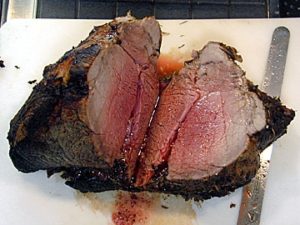“You are not to eat any animal that dies naturally; although you may let a stranger staying with you eat it, or sell it to a foreigner; because you are a holy people for Adonai your God.”-Deuteronomy 14:21
From verse 21, we’re given some interesting instructions concerning WHEN it’s okay to eat clean animals.
We’re told it all has to do with the way an animal’s life ended.
The general rule set down here is that if an animal died due to “natural” causes such as old age, disease, or accidental injury, then the animal was forbidden from being eaten by Israelites.
However, the Scripture tells us the meat from that particular animal may be given to a “stranger” or a “foreigner”.
“Stranger” is GER in Hebrew and “foreigner” is NOKRI in Hebrew.
A couple of points here.
First, the fact that the Lord is in this instance barring His people from eating an otherwise clean animal is more evidence supporting what I’ve previously said that hygiene or nutrition have absolutely nothing to do with whether an animal is CLEAN or not.
In other words, God was NOT telling Israel to give unsafe or poisonous food to the “strangers” or “foreigners”.
The meat given to the non-Israelites was perfectly safe for consumption.
It’s just that such meat was off limits to the Israelites because the animal had died from natural causes.
Let’s talk a little bit about the meaning of GER (stranger) and NOKRI (foreigner).
A GER was a non-Hebrew person who lived among Israel, honored the God of Israel and the Law of Moses and as a result had agreed to be part of the Israelite community.
You might be thinking, does that make him a convert?
The answer is no.
The reason is because a GER had not gone so far as to join one of the Israelite tribes in an official capacity.
A gentile who undergoes an official conversion becomes a full-fledged Jew, period.
And once his (or her) conversion is completed, there ain’t no turning back.
Now a NOKRI is one step further away from Israel than a GER is.
A NOKRI dwells alongside the Hebrews but NOT among the Hebrews.
That’s an important distinction to make.
In other words, he dwells OUTSIDE of the camp of Israel.
He doesn’t necessarily honor the God of Israel nor is he expected or obligated to.
Technically speaking, of the two, I would say I’m a GER.
Because although I don’t dwell among the Israelites (though that may change in the near future), I definitely honor and love the God of Israel.
Think about it.
What kind of nut would wake up at 6am every morning and without fail get his rocks off by blogging through the Torah?
Anyway, getting back to my discussion on the difference between a GER and a NOKRI, understand that what I’ve just explained are very general guidelines.
In reality, the difference between a GER and NOKRI were like the differences between different societal classes as determined by economic status with the GER generally being better off financially than the NOKRI.
These types of class systems existed in pretty much all societies (as they do today) at the time.
Let’s next move on to the following question that I bet is front and center in your mind at the moment.
Why is an otherwise clean animal just because it dies of natural causes okay for a GER or NOKRI to eat but not okay for a Hebrew to eat?
I mean Deuteronomy 14:21 specifically says the Hebrew is to either offer the meat from such an animal to the GER as a free gift or sell it for money to the NOKRI.
Well, we’re also told the answer in verse 21 in the phrase that comes right afterwards:
“because you are a holy people for Adonai your God”
There you have it.
And this is something I’ve been hammering home from day one.
The God of Israel is a God of election, division and separation AND…
…this principle is also to apply to the diet of the Israelites…
…who are to follow different food laws than the gentiles…
…as a means of separating themselves from them.




Leave a Reply